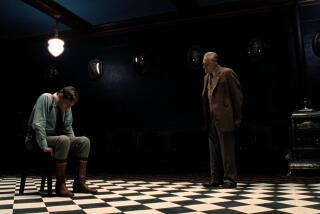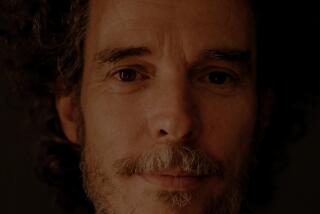MOVIE REVIEW : ‘Howards End’: Splendor in the Grass
- Share via
Surrender to “Howards End.” Give yourself willingly to this most assured motion picture, to its remarkable acting and storytelling and the plush richness of its setting. For everyone who’s yearned for the dimly remembered satisfactions of traditional filmmaking, for movies of passion, taste and sensitivity that honestly touch every emotion, this is the one you’ve been waiting for.
Perhaps the most striking thing about the success of “Howards End” (at the Royal and the Colorado, rated PG) is how old-fashioned are the tools used to achieve it. Not only is it based on E. M. Forster’s 1910 novel of families in love and in conflict, but its filmmaking techniques owe nothing to modern flash and dash. With a script that unfolds like an elegant tapestry and impeccable across-the-board acting from people like Anthony Hopkins, Vanessa Redgrave and most especially Emma Thompson, extravagant directorial flourishes would have just gotten in the way.
Experience is essential in promoting this kind of restraint, and producer Ismail Merchant, director James Ivory and screenwriter Ruth Prawer Jhabvala have been collaborating with one another off and on for 30 years. Still, nothing they’ve done before comes close to this, and that includes the splendidly comic “A Room With a View,” nominated for a surprising seven Oscars and winner of three, numbers that “Howards End” is a good bet to surpass.
Though always faultlessly made, what previous films like “The Bostonians,” “Maurice” and “Mr. & Mrs. Bridge” invariably lacked was any kind of complex emotional life, something capable of setting off lasting and heartfelt reverberations below an admittedly exquisite surface.
But, like a journeyman athlete who puts it all together for a single glorious day, the Merchant-Ivory-Jhabvala team has here called on everything the three have done before and raised their work to a new level of accomplishment and involvement. And after doing so many films in Edwardian dress, even their trademark period faithfulness has reached a degree of authenticity that is the more convincing because it seems so casually done.
Having a novelist as psychologically acute as Forster to work off of certainly gave a leg up to all concerned. In addition to his facility with character and relationships, Forster in “Howards End” was dealing with a powerful theme, the pangs of a society in terrible flux. There was a serpent loose in the genteel garden that was Edwardian England, the serpent of the modern world, fated to bite everyone and change everything. The only question was, how much?
Like the novel it carefully follows, “Howards End” begins not head-on but from an angle, with a peripheral but telling relationship. Helen Schlegel (Helena Bonham Carter) is visiting with the Wilcoxes, a family that she and her sister, Margaret (Emma Thompson), met the previous spring, at Howards End, the Wilcoxes’ romantic old pile of an English country home.
Helen and one of the Wilcox sons become briefly infatuated with each other, which leads to the comic intervention of the Schlegel girls’ busybody Aunt Juley (Prunella Scales). The young people are soon separated, but though it’s assumed that all ties have been severed, the two families are fated to connect much more than anyone suspects.
Certainly, the Schlegels and the Wilcoxes would seem to have very little in common. The three Schlegel siblings (Helen and Margaret have a rather ineffectual younger brother named Tibby) are genteel, cultured people with a lively interest in London’s intellectual scene. The Wilcoxes, by contrast, are typified by father Henry (Anthony Hopkins), the essence of triumphant capitalism, a wealthy businessman who is abrupt, distant and often unfeeling.
But when the Wilcoxes come to London for a stay and take a flat practically next door to the Schlegels, Ruth (Vanessa Redgrave), who is Henry’s wife, and Margaret renew their acquaintance. Very different from the other Wilcoxes, Ruth is passionate about the old ways, in love with English tradition in general and with the property at Howards End, which belongs to her, not her husband, in particular. Though she would not seem to have much in common with the chatty, terribly up-to-date Margaret, the two find an unspoken emotional kinship growing between them.
At the same time, the impulsive and high-strung Helen takes an umbrella by mistake (a habit of hers) and makes the inadvertent acquaintance of one Leonard Bast (Sam West). Bast is a low-paid clerk at an insurance company whose situation is economically precarious, and that has made him touchy and easily offended. Possessed of a terribly earnest poetic soul, he is dazzled by the Schlegels’ easy, spirited ways and by the cultured world they so effortlessly inhabit.
Though the Schlegels, Wilcoxes and Leonard Bast obviously represent different social classes, it is the wonderful grace of “Howards End” to make us care desperately about them as simply people. And though the film has a cracker-jack storyline, which beautifully intertwines these three groups and involves them in a series of shattering events, it is the depth and breadth of its characters that make it memorable. Far from being presented to us fully formed, these protagonists gradually develop and change, revealing who they are not only to the audience but often simultaneously to themselves and each other as well.
None of this would be possible, of course, without acting of the most subtle, delicate sort, and “Howards End” has that to such an extent it feels unfair to single anyone out. Still, attention must be paid to Hopkins’ thoughtful work as a man who is more indifferent to good than actually bad, to Redgrave’s wan and vulnerable wraith from a dying world, and, most of all, to Thompson.
Married to actor-director Kenneth Branagh and best known in this country for co-starring with him in “Henry V” and “Dead Again,” Thompson has a reputation in England every bit as strong as her husband’s, and her performance here leaves no doubt as to why. Because, though you don’t immediately suspect it, Margaret Schlegel is the force that powers “Howards End,” the only character possessed of the moral strength to cope with a society in extremis.
With her bright smile and chatterbox qualities, given to bustling into restaurants and saying things like “I want to eat heaps,” she seems at first glance to be little more than a cheery blithe spirit. But the triumph of Thompson’s performance is the way she gradually allows us to see past that surface and realize how wise and substantial Margaret is.
An actress who can break your heart just by widening her eyes, Thompson also manages the extremely difficult feat of making decency and caring into the most heroic of qualities. The triumph of these virtues, like the triumph of “Howards End,” has been a long time coming but no one seeing this exceptional film will doubt that the wait has been worthwhile.
‘Howards End’
Emma Thompson: Margaret Schlegel
Anthony Hopkins: Henry Wilcox
Vanessa Redgrave: Ruth Wilcox
Helena Bonham Carter: Helen Schlegel
Sam West: Leonard Bast
Prunella Scales: Aunt Juley
A Merchant Ivory production in association with Film Four International, released by Sony Classics. Director James Ivory. Producer Ismail Merchant. Executive producer Paul Bradley. Screenplay Ruth Prawer Jhabvala. Cinematographer Tony Pierce-Roberts. Editor Andrew Marcus. Costumes Jenny Beavan, John Bright. Music Richard Robbins. Production design Luciana Arrighi. Art director John Ralph. Set decorator Ian Whittaker. Running time: 2 hours, 20 minutes.
MPAA-rated PG.
More to Read
Only good movies
Get the Indie Focus newsletter, Mark Olsen's weekly guide to the world of cinema.
You may occasionally receive promotional content from the Los Angeles Times.











